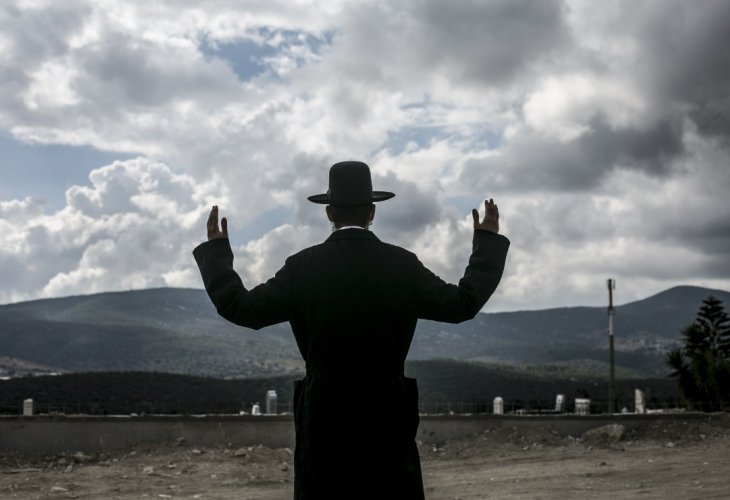Torah Personalities
A Song in the Darkness
How the Skolener Rebbe’s Melody Moved a Nation and Sparked a Daring Rescue
 (Photo: shutterstock)
(Photo: shutterstock)In the shadow of communist oppression, one Rebbe’s spiritual courage, one melody, and one unexpected alliance led to a miraculous escape from certain death.
Fear Behind the Iron Curtain
In 1956, a wave of terror swept through Hungary as a national uprising against the communist regime brought violence and chaos. The shockwaves reached neighboring Romania, where Jewish communities came under immediate threat. Dozens of rabbis, teachers, ritual slaughterers, and religious leaders were imprisoned, tortured, and sentenced to long terms in jail. The situation grew increasingly desperate.
In the heart of this storm stood the Skolener Rebbe, Rabbi Eliezer Zusia Portugal. Trapped under a regime that censored all communication, the Rebbe could not reach the outside world to plead for help. Even fundraising for Jewish prisoners and their families was prohibited. Still, he and his wife, Rebbetzin Sheina Rachel, continued to care for Jewish orphans, some of whom were officially registered as their children.
A Melaveh Malka with a Secret Message
To appear democratic to the West, the Romanian regime periodically invited foreign dignitaries to showcase a false image of Jewish prosperity. One such guest was Dr. Yaakov David (Kurt) Wilhelm, the Chief Rabbi of Sweden. He was traditional and aligned with European high society and he had significant global influence.
During a visit to Bucharest, Rabbi Wilhelm was honored at a Melaveh Malka organized by the Jewish community. All local rabbis were expected to attend, even those who feared the consequences of speaking truth. Only the Skolener Rebbe delayed his arrival, insisting on observing his custom of extending Shabbat for two full hours after nightfall.
When he finally entered, the entire room stood in reverence. Rabbi Wilhelm, seated beside him, was puzzled. Who was this humble man in an old shtreimel (fur hat) who commanded such awe?
Then came the moment that changed everything.
Rabbi Rosen invited the Rebbe to sing a melody. The Skolener Rebbe began to chant his haunting composition, “Tavo Lefanecha Anakat Asir” (“May the Cry of the Prisoner Come Before You”). The song, filled with longing and pain, was a veiled outcry for the suffering Jews of Romania. The emotion in his voice and the tears in his eyes were a silent scream that pierced the heart of the Swedish rabbi. He understood the message perfectly.
A Rebbe in Chains, a Rabbi on a Mission
A few years later, in 1959, the Romanian government arrested the Rebbe and his son. They were tortured mercilessly, their lives hanging by a thread. Efforts from across the globe failed to secure their release.
Then, something remarkable happened.
In London, the Satmar Rebbe met with activist Rabbi Aharon Goodman and urged him to find help for the imprisoned Skolener Rebbe, no matter the cost. Goodman responded that the only person with potential influence was UN Secretary-General Dag Hammarskjöld, who had no direct ties to the Jewish community. However, Hammarskjöld had one trusted Jewish friend from university: Rabbi Kurt Wilhelm.
In a twist of Divine providence, Wilhelm happened to be visiting London at that very moment. Rabbi Goodman called him immediately. Upon hearing of the Rebbe’s imprisonment, Wilhelm broke down in tears. “He is my Rebbe,” he cried. “A holy man. A righteous soul.”
Wilhelm reached out to Romanian officials, but his request was denied. Undeterred, he flew to New York to meet Hammarskjöld in person. There, he passionately described the Skolener Rebbe’s selflessness and saintliness. Hammarskjöld agreed to act.
He applied intense diplomatic pressure, even flying to Romania himself. Simultaneously, U.S. President Dwight D. Eisenhower intervened, and a formal invitation from an American synagogue helped reframe the Rebbe’s release as a community necessity.
Freedom and a Legacy of Redemption
The Romanian government finally relented. On the eve of Shabbat Nachamu (the Shabbat after Tisha B'Av), the Rebbe and his son were released, but they refused to travel until after Shabbat and were forced to remain in prison for a few more days. On Rosh Chodesh Nisan 1960, their paperwork was finally in order,, and they were able to leave Romania. “I am not leaving for myself,” the Rebbe told his tearful followers. “I am leaving for you.”
That very morning, he composed a new melody: “Shiru Lo, Zamru Lo, Sichu Bechol Nifla’otav” (“Sing to Him, Speak of All His Wonders”).
Settling in America, the Rebbe immediately dedicated himself to rescuing others. Even when the odds seemed hopeless, he succeeded in obtaining exit visas for dozens of Jews. Through his organization “Chesed L’Avraham,” he supported orphans, ransomed captives, and reignited the spiritual spark of postwar Jewry.
He passed away in 1982 at the age of 84.

